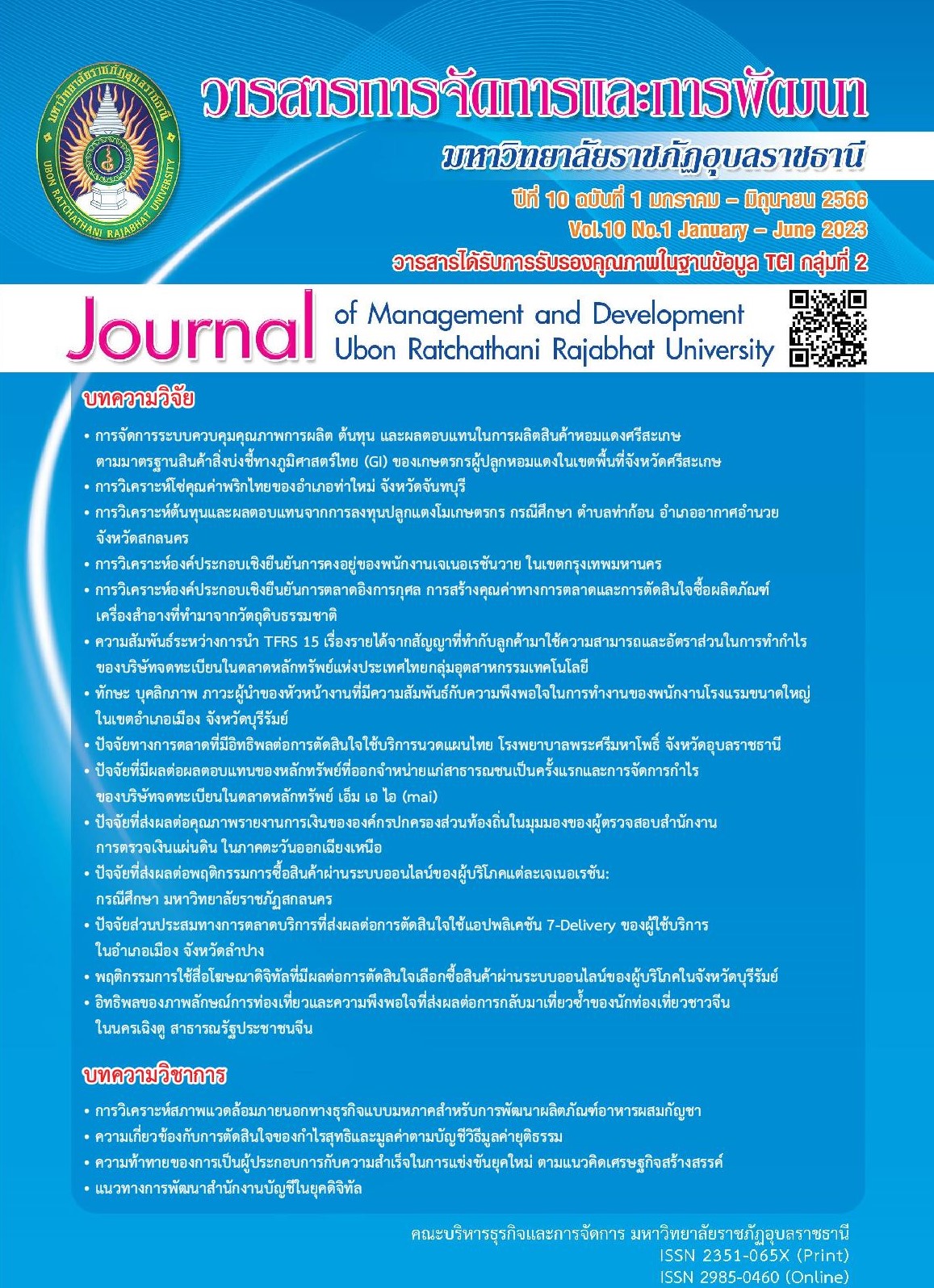การวิเคราะห์องค์ประกอบเชิงยืนยันการคงอยู่ของพนักงานเจเนอเรชันวาย ในเขตกรุงเทพมหานคร
บทคัดย่อ
การวิจัยนี้มีวัตถุประสงค์เพื่อวิเคราะห์องค์ประกอบเชิงยืนยันการคงอยู่ของพนักงานเจเนอเรชันวายในเขตกรุงเทพมหานคร โดยใช้การวิจัยเชิงปริมาณ เก็บรวบรวมข้อมูลโดยใช้แบบสอบถาม จากพนักงาน
เจเนอเรชันวายที่ปฏิบัติงานอยู่ในเขตกรุงเทพมหานคร จำนวน 400 คน วิเคราะห์ข้อมูลโดยใช้การวิเคราะห์องค์ประกอบเชิงยืนยัน ผลการวิจัยพบว่า องค์ประกอบการคงอยู่ของพนักงานเจเนอเรชันวายในเขตกรุงเทพมหานคร ได้แก่ การสนับสนุนจากผู้บังคับบัญชา การฝึกอบรมและพัฒนา สมดุลชีวิตการทำงาน ค่าตอบแทน ลักษณะงาน และความก้าวหน้าในอาชีพ โมเดลมีความสอดคล้องกลมกลืนกับข้อมูลเชิงประจักษ์ (χ2= 10.008, df = 6, p = .1243, RMSEA = .041, CFI = .999, TLI = .997, SRMR = .005) ผลการวิจัยนี้เป็นประโยชน์ต่อองค์การในการนำไปใช้เป็นแนวทางออกแบบวิธีปฏิบัติทางทรัพยากรมนุษย์เพื่อรักษาพนักงานกลุ่มนี้ให้คงอยู่เพื่อสร้างความสำเร็จให้กับองค์การต่อไป
เอกสารอ้างอิง
มาลีวัล เลิศสาครศิริ มาลินี ปั้นดี และวิลาวัณย์ เพ็งพานิช. (2563). การเสริมสร้างความพึงพอใจในงาน
และการคงอยู่ในองค์กรของพยาบาลวิชาชีพสำเร็จใหม่. วารสารวิทยาลัยพยาบาลพระปกเกล้า
จันทบุรี, 31(2), 201-212.
สุนทรพจน์ ดำรงพานิช. (2563). โปรแกรม Mplus กับการวิเคราะห์ข้อมูลทางพฤติกรรมศาสตร์และ
สังคมศาสตร์. (พิมพ์ครั้งที่ 2). กรุงเทพฯ: สำนักพิมพ์จุฬาลงกรณ์มหาวิทยาลัย.
Ahmed, Z., Othman, N. B. & Yean, T. F. (2020). Impact of Human Resource Management
Practices on Employee Retention: A Study of Public Healthcare Sector of Pakistan.
IOSR Journal of Business and Management (IOSR-JBM), 22(7), 9-15.
Alhmoud, A. & Rjoub, H. (2020). Does Generation Moderate the Effect of Total Rewards on
Employee Retention? Evidence from Jordan. SAGE Open, July-September, 1-15.
Ali, S. A. M. et al. (2014). Hackman and Oldham’s Job Characteristics Model to Job Satisfaction. Procedia – Social and Behavioral Sciences, 129, 46-52.
Al-Suraihi, W. A. et al. (2021). Employee Turnover: Causes, Importance and Retention Strategies. European Journal of Business and Management Research, 6(3), 1-10.
Aman-Ullah, A. et al. (2021). The Impact of Job Security, Job Satisfaction and Job Embeddedness on Employee Retention: An Empirical Investigation of Pakistan’s Health-care Industry. Journal of Asia Business Studies, 16(6), 904-922.
Bahar, A. M. et al. (2020). The Efficacy of Work-life Balance for Young Employee Retention:
A Validated Retention Model for Small Private Industries. International Journal of Process Management and Benchmarking, 12(2), 1-16.
Bolton, R. N. et al. (2013). Understanding Generation Y and their Use of Social Media:
A Review and Research Agenda. Journal of Service Management, 24(3), 245-267.
Bonett, D. G., & Wright, T. A. (2015). Cronbach’s Alpha Reliability: Interval Estimation,
Hypothesis Testing, and Sample Size Planning. Journal of Organizational
Behavior, 36, 3-15.
Chelliah, J. & Clarke, E. (2011). Collaborative Teaching and Learning: Overcoming the Digital
Divide? On the Horizon, 19(4), 276-285.
Das, B. L. & Baruah, M. (2013). Employee Retention: A Review of Literature. IOSR Journal of
Business and Management (IOSR-JBM), 14(2), 8-16.
Eisenberger, R. et al. (2002). Perceived Supervisor Support: Contributions to Perceived Organizational Support and Employee Retention. Journal of Applied Psychology, 87(3), 565–573.
Fasih, S. T., Jalbani, A. A., & Mubarik, S. (2021). Consequences of Exclusive Talent
Management and the Mediating and Moderating Roles of Distributive Justice and
Procedural Justice. Market Forces College of Management Sciences, 16(2),
-150.
Frye, W. D. et al. (2020). What Factors Influence Generation Y’s Employee Retention in the Hospitality Industry? An Internal Marketing Approach. International Journal of Hospitality Management, 85(2), 1-9.
Ghani, B. et al. (2022). Challenges and Strategies for Employee Retention in the Hospitality Industry. Review Sustainability (Switzerland), 14(5), 1-26.
Gupta, V. (2019). Talent Management Dimensions and Their Relationship with Retention of
Generation-Y Employees in the Hospitality Industry. International Journal of
Contemporary Hospitality Management, 31(10), 4150-4169.
Hair, J. F. et al. (2019). Multivariate Data Analysis. (8th ed.). London: Cengage Learning.
Hamid, S. (2019). The Strategic Position of Human Resource Management for Creating
Sustainable Competitive Advantage in the VUCA World. Journal of Human
Resources Management and Labor Studies, 7(2), 1-4.
Haque, A., Fernando, M. & Caputi, P. (2019). The Relationship between Responsible
Leadership and Organisational Commitment and the Mediating Effect of Employee
Turnover Intentions: An Empirical Study with Australian Employees. Journal of
Business Ethics, 156, 759-774.
Hassan, M. M. et al. (2021). Retention Approaches of Millennial at Private Sector: Mediating Role of Job Embeddedness. Global Business Review, 22(4), 1-27.
Hu, L. & Bentler, P. M. (1999). Cutoff Criteria for Fit Indexes in Covariance Structure Analysis:
Conventional Criteria versus New Alternatives. Structural Equation Modeling, 6,
-55.
Hurst, J. L. & Good, L. K. (2009). Generation Y and Career Choice: The Impact of Retail
Career Perceptions, Expectations and Entitlement Perceptions. Career
Development International, 14(6), 570-593.
Josiam, B. M. et al. (2009). An Empirical Study of the Work Attitudes of Generation Y College Students in the USA: The Case of Hospitality and Merchandising Undergraduate Majors. Journal of Services Research, 9(1), 5-30.
Kim, M. R., Knutson, B. J. & Choi, L. (2016). The Effects of Employee Voice and Delight on
Job Satisfaction and Behaviors: Comparison Between Employee Generations.
Journal of Hospitality Marketing & Management, 25(5), 563-588.
Kline T. (2005). Psychological Testing. California: Sage.
Malik, E., Baig, S. A. & Manzoor, U. (2020). Effect of HR Practices on Employee Retention:
The Role of Perceived Supervisor Support. Journal of Public Value and Administration Insights, 3(1), 1-7.
Naim, M. F. & Lenka, U. (2018). Development and Retention of Generation Y Employees: A
Conceptual Framework. Employee Relations, 40(2), 433-455.
Oldham, G. R. & Fried, Y. (2016). Job Design Research and Theory: Past, Present and Future.
Organizational Behavior and Human Decision Processes, 136, 20-35.
Putri, S., Sjabadhyni, B. & Mustika, M. D. (2018). “Making Generation Y Stay”: The Mediating
Role of Organizational Commitment. Psikohumaniora: Jurnal Penelitian Psikologi,
(2), 141-152.
Queiri A., Yusoff, W. F. W. & Dwaikat, N. (2015). Explaining Generation-Y Employee’s Turnover in
Malaysian Context. Asian Social Science, 11(10), 126-138.
Riyanto, S., Ariyanto, E. & Sihombing, L. (2019). Work Life Balance and Its Influence on
Employee Engagement “Y” Generation in Courier Service Industry. International
Review of Management and Marketing, 9(6), 25-31.
Seqhobane, M. & Kokt, D. (2021). How Do Job Characteristics Influence the Motivation of
Millennial Hospitality Employees? SA Journal of Human Resource Management,
(1), 1-9.
Tabachnick, B. G. & Fidell, L. S. (2007). Using Multivariate Statistics. (5th ed.) Boston: Allyn
and Bacon.
Younas, M. & Bari, M. W. (2020). The Relationship Between Talent Management Practices
and Retention of Generation ‘Y’ Employees: Mediating Role of Competency
Development. Economic Research-Ekonomska Istraživanja, 33(1), 1330-1353.

ดาวน์โหลด
เผยแพร่แล้ว
ฉบับ
ประเภทบทความ
สัญญาอนุญาต

อนุญาตภายใต้เงื่อนไข Creative Commons Attribution-NonCommercial-NoDerivatives 4.0 International License.
บทความที่ตีพิมพ์ในวารสาร เป็นงานเขียนของนักวิจัยหรือนักวิชาการแต่ละท่านโดยเฉพาะ มิใช่ความเห็นและความรับผิดชอบใดๆ ของกองบรรณาธิการวารสารการจัดการและการพัฒนา มหาวิทยาลัยราชภัฏอุบลราชธานี
บทความ ข้อมูล เนื้อหา รูปภาพ ฯลฯ ที่ได้รับการตีพิมพ์ในวารสารฯ ถือเป็นลิขสิทธิ์ของวารสารการจัดการและการพัฒนา มหาวิทยาลัยราชภัฏอุบลราชธานี หากบุคคลหรือหน่วยงานใดต้องการนำทั้งหมดหรือส่วนหนึ่งส่วนใดไปเผยแพร่ต่อหรือเพื่อกระทำการใดๆ จะต้องทำการอ้างอิงมายังวารสาร




